Archives
-

Ocean and Coastal Research (regular volume)
Vol. 73 (2025)Ocean and Coastal Research (OCR) is an international, peer-reviewed, and open-access journal with no article processing charges (APC) that publishes research in Oceanography, Fisheries, Marine Conservation, and related fields in Marine Science. Ocean and Coastal Research adopts a continuous publication model (CAP/rolling pass) of articles submitted in the English language.
This is the Volume 73 (2025) of the Ocean and Coastal Research.
-
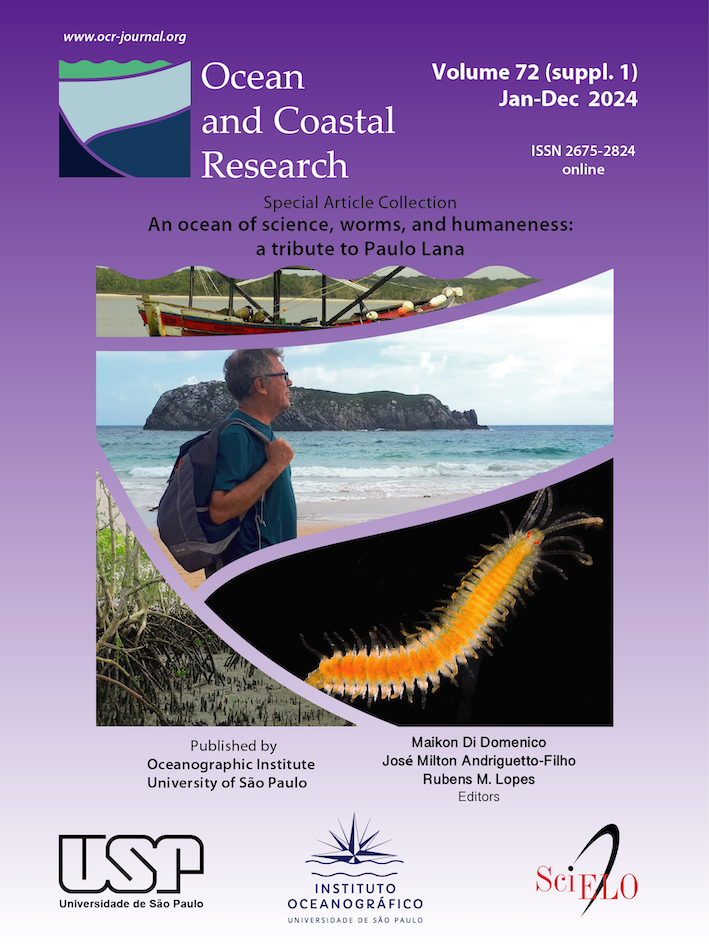
Ocean and Coastal Research: An ocean of science, worms, and humaneness: a tribute to Paulo Lana (Special Article Collection)
Vol. 72 No. Suppl. 1 (2024)The sudden and unexpected loss of Paulo da Cunha Lana on June 29, 2022 was a great shock for the marine science community in Brazil and abroad. Paulo was greatly respected as a world class scientist and held in high esteem as a human being. He was, and will continue to be in our memories, a truly inspiring ocean scientist.
Paulo acted as a taxonomist, ecologist, and oceanographer. As a researcher and teacher, he supervised and published in areas such as benthic ecology, mangrove and saltmarsh ecology, taxonomy, biology, ecology of polychaete annelids, environmental impact assessment, and coastal environmental management, with distinguished global recognition.
He has established a solid line of research at the Center for Marine Studies of the Federal University of Paraná (CEM/UFPR) in Brazil since 1981, a research facility he helped to consolidate, serving as Director from 1991 to 1994. He reached a Full Professor position in 2010 and retired in 2020. His greatest professional pride was to have effectively supervised more than 120 undergraduate and graduate students, and post-doctoral researchers. Paulo had a great passion for devoting countless hours introducing students to the rationales of scientific thinking, especially hypotheses formulation, as well as teaching how to observe and set up experiments in the field.
He participated in the creation, implementation, and coordination of an Oceanography bachelor’s course (where he worked since 2000), and two postgraduate degrees - in Coastal and Oceanic Systems (2006), and in Environment and Development (1992), both at UFPR. He also intensively acted as supervisor and lecturer on the Postgraduate Program in Zoology at UFPR since 1984. As a lecturer, he was honored during graduation ceremonies multiple times during his career.
Paulo published 35 books or book chapters, and more than 160 peer-reviewed articles in national and international journals with his students, frequently collaborating with foreign colleagues. Paulo and his students helped consolidate polychaetology in Brazil, including systematic phylogenetic inference. He was president of the International Polychaetological Association from 2010 to 2013.
Paulo was an enthusiastic scientist and advisor, showing creativity and geniality. The combination of charisma and simplicity as a human being, with his commitment to research and scientific thinking guided by hypotheses that reflect cause-effect relationships has inspired students and fellow scientists worldwide. He always promoted exhaustive deductive reasoning exercises, training his audience to construct "if/then" hypotheses whenever possible. Paulo used his commitment to Brazilian education as a motivation, understanding the difficulties of promoting science with quality when training citizens and scientists with different backgrounds. He dedicated himself to a dream of building science for everyone, and with everyone who had the luck of having crossed his path.
The aim of this special article collection is to pay homage to our dear friend Paulo. We welcomed manuscripts on the broad scope of ocean, marine and coastal sciences, authored by people who cherished Paulo or feel their lives and careers were somehow touched or inspired by him.
This is the Volume 72, Suppl. 1 (2024) of the Ocean and Coastal Research.
-
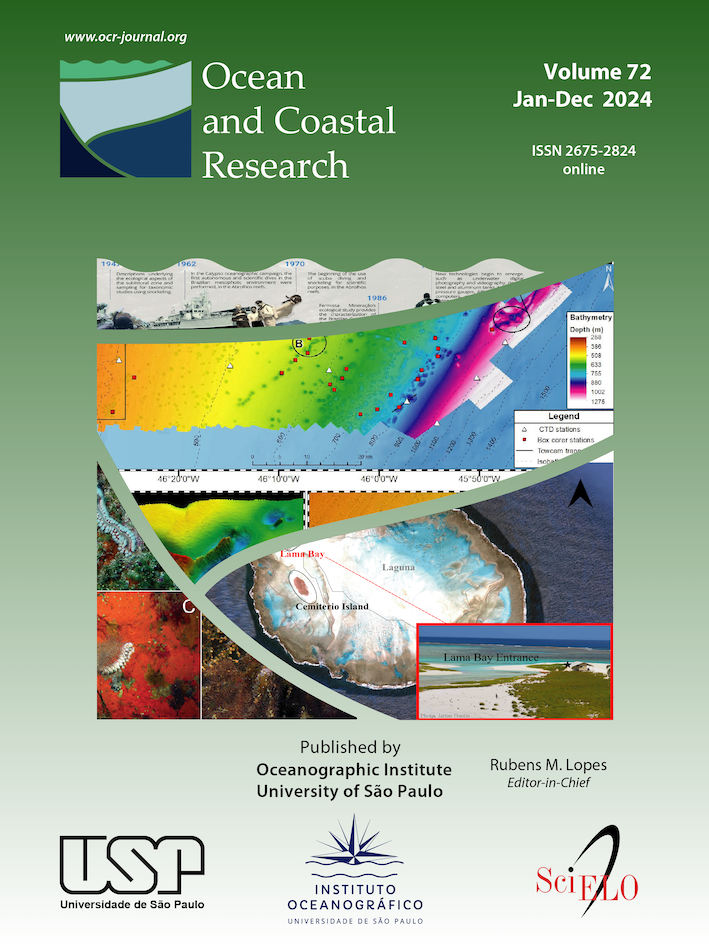
Ocean and Coastal Research (regular volume)
Vol. 72 (2024)Ocean and Coastal Research (OCR) is an international, peer-reviewed, and open-access journal with no article processing charges (APC) that publishes research in Oceanography, Fisheries, Marine Conservation, and related fields in Marine Science. Ocean and Coastal Research adopts a continuous publication model (CAP/rolling pass) of articles submitted in the English language.
This is the Volume 72 (2024) of the Ocean and Coastal Research.
-

Ocean and Coastal Research: Subsidies for ecosystem-based management in an offshore oil and gas exploration area, Santos Basin, Brazil (Special Article Collection)
Vol. 71 No. Suppl. 3 (2023)The Santos Basin, located in the South-Western Atlantic, has a total area of 350,000 km2 and extends down to water depths around 3,000 m. The Basin is one of the largest pre-salt oil reservoirs in the world, with an estimated recoverable oil reserve of 21.6 billion oil barrels. This special issue explores recent findings from an ongoing interdisciplinary project named “Chemical, Biological and Geological Characterization of the Benthic System of the Santos Basin”, which is part of a regional environmental characterization program designed by the Brazilian State oil company (Petrobras). This project started in 2018 in a partnership involving 10 Brazilian universities and the company’s research center (CENPES). It was motivated by the lack of geological, oceanographic, chemical, and biological scientific knowledge, which severely compromised initiatives of environmental planning management practices aimed at conciliating the exploration and production activities in the basin, and preservation of biodiversity and environmental health on a regional scale. During this project physical, chemical, sedimentological and biological data of the benthic system are acquired to enhance the understanding of the functioning of the benthic system, its spatial variability, and the coupling with pelagic processes. This broad context sets the considerable challenge and opportunity for marine science, industry, and management to cooperate and together achieve sustainable economic growth through data-driven management.
Ecosystem-based management implies the need to monitor an increased range of environmental conditions and ecological components of the marine environment (Kuspschus et al. 2016). The goal is to describe and monitor the processes of change. Such an approach requires a clear understanding of the inter- and intra-relationships among the several biotic and abiotic components of the system and how each of these components may respond to anthropogenic changes. When successfully applied, indicators of the ecosystem quality are selected and constantly monitored to minimize environmental risks, allows the constant incorporation of data, and provide means to test hypotheses on how biodiversity, biogeochemical processes, and anthropogenic activities interact.
The objectives of this issue are to promote the integration of the main oceanographic processes in Santos Basin from distinct perspectives of physical, benthic, and pelagic and how this information can be integrated to guide management decisions in face of increasing anthropogenic activities.
This is the Volume 71, Suppl. 3 (2023) of the Ocean and Coastal Research.
-

Ocean and Coastal Research: Environmental variability and hazards on the coastal and continental shelf regions of South America and the Caribbean (Special Article Collection)
Vol. 71 No. Suppl. 2 (2023)The South and western Tropical Atlantic oceans are known to play important roles in the seasonal and larger scales climate variability of South and Central America. At the same time, the effects of the crescent anthropogenic influence in the coastal seas and transitional environments through marine pollution and urban expansion are poorly studied, although deeply impacting coastal populations. Recent episodes of continental and coastal disasters, including large oil spill events off the coast of northeastern Brazil and in the Gulf of Mexico, for example, express the need for a better understanding of these environments and the continuous threats to marine life there. Climate variability and change also directly affect the coastal regions. In the tropics, for instance, the combined, interbasin connections between the Atlantic and the Pacific oceans during both positive (El Niño) and negative (La Niña) phases of the El Niño – Southern Oscillation (ENSO) phenomena, force remote positive or negative precipitation anomalies far beyond coastal regions in the Americas and worldwide. In the subtropical South Atlantic, sea surface temperature anomalies (SSTA) occurring on the continental shelf have a direct impact on the fish recruitment and consequently in subsequent captures of pelagic fish, impacting the economy of fisheries communities and industry. In association with SSTA and other oceanic mesoscale phenomena, the ocean-atmosphere coupling processes are the major forcing mechanisms for surface wind and (heat, momentum, and gases) air-sea fluxes that may impact coastal regions in both South and Central America. Heat waves, atmospheric blocking, cyclogenesis of both extra-tropical and tropical (hurricanes) cyclones, and storm surges are some of the known hazards affecting the coastal regions with an origin at the sea. Most of these phenomena, at short to long time periods, impact the coastal environment through coastal erosion. At longer time scales, the known impacts of climate change affect the World Ocean through sea level rise and ocean acidification, imposing new threats to coral reefs and transitional environments such as estuaries, salt marshes, mangroves, and others. Overall, we need to have a better understanding of how all these processes occurring on the South and western Tropical Atlantic oceans at different spatial and temporal scales affect the coastal and continental shelf regions.
The objective of this special issue is to improve our understanding of the physical, biological, chemical, geological, and biogeochemical processes of the coastal regions surrounding both the South and western Tropical Atlantic oceans.
This is the Volume 71, Suppl. 2 (2023) of the Ocean and Coastal Research.
-

Ocean and Coastal Research: Research in a RAMSAR site: The Cananéia-Iguape-Peruibe estuarine-lagoon complex, Brazil (Special Article Collection)
Vol. 71 No. Suppl. 1 (2023)Marine Protected Areas (MPAs) are critically important to preserve species and maintain ecosystem dynamics. However, such conservation units are constantly subject to the input of chemical compounds and other anthropogenic impacts, which can change natural processes and promote adverse effects on living organisms.
Although there are 27 Ramsar sites (priority areas for international conservation) in Brazil, few are in marine ecosystems. The Cananéia-Iguape estuarine-lagoon complex (CIELC) integrates the Cananéia-Iguape-Peruíbe environmental protection area as a biosphere reserve (UNESCO), and in 2017 was included on the Ramsar list of wetlands of international importance, and is considered a priority area for conservation. The southern region of the CIELC is relatively well preserved, but the northern sections receive anthropogenic inputs from Ribeira de Iguape river outflow via Valo Grande (an artificial channel).
This special article collection brings together contributions aiming to promote a more complete understanding of ecosystem processes in this important coastal wetland, providing a solid scientific background for conservation actions and policies.
This is the Volume 71, Suppl. 1 (2023) of the Ocean and Coastal Research.
-
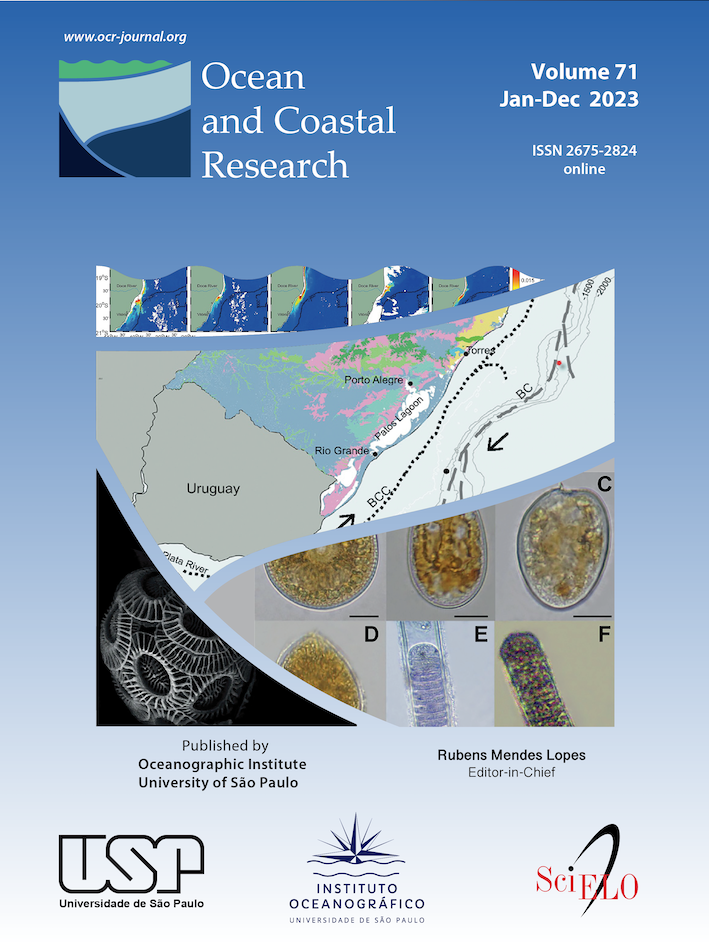
Ocean and Coastal Research (regular volume)
Vol. 71 (2023)Ocean and Coastal Research (OCR) is an international, peer-reviewed, and open-access journal with no article processing charges (APC) that publishes research in Oceanography, Fisheries, Marine Conservation, and related fields in Marine Science. Ocean and Coastal Research adopts a continuous publication model (CAP/rolling pass) of articles submitted in the English language.
This is the Volume 71 (2023) of the Ocean and Coastal Research.
-

Ocean and Coastal Research: Biology and Geochemistry of seabed pockmark and carbonate mound habitats (Special Article Collection)
Vol. 70 No. Suppl. 2 (2022)This Special Article Collection presents recent discoveries from the ongoing multidisciplinary project ‘Biology and Geochemistry of Oil and Gas Seepages, Southwest Atlantic (BIOIL)’, coordinated by IOUSP and funded by Shell Brasil Petróleo LTDA through R&D levy regulation of Agência Nacional do Petróleo, Gás Natural e Biocombustível (ANP) of the Brazilian Government. In this project, we will map and study the biological and geochemical conditions of cold seeps areas in the Brazilian southeast continental margin.
Even though seeps and associated communities are widespread on continental margins worldwide, little information is found for the eastern South American continental margin. Oil and gas seepages are especially important sites not only for geological reasons but also for deep-water marine ecosystems. The Santos Basin deep-seafloor is punctuated by a series of geomorphological features (i.e., salt diapirs and pockmarks) that attest to the presence of oil and gas in the seafloor subsurface. This suggests that natural seepage of hydrocarbon fluids through sediments occurs throughout this margin. Pockmarks are formed by the escape of gases from the subsurface, tectonically conducted through salt diapirism. They are circular/elliptical-shaped depressions that can be over 1 km wide and 100 m deep. Light hydrocarbon fluid flow through the sediments may also build up authigenic carbonates that can further be colonized by cold-water corals, generating large carbonate mounds over geological time, normally positioned at the border of pockmarks. These depressions and mounds on the seafloor affect the benthic ecosystem in multiple ways in terms of water flow, type and amount of food availability, and sedimentation rates, where different bottom-associated communities thrive.
The objectives of this Special Article Collection are to explore new discoveries on different oceanographic perspectives of the Santos Basin seabed, integrating biological, geological, and geochemical data.
This is the Volume 70, Suppl. 2 (2022) of the Ocean and Coastal Research.
-
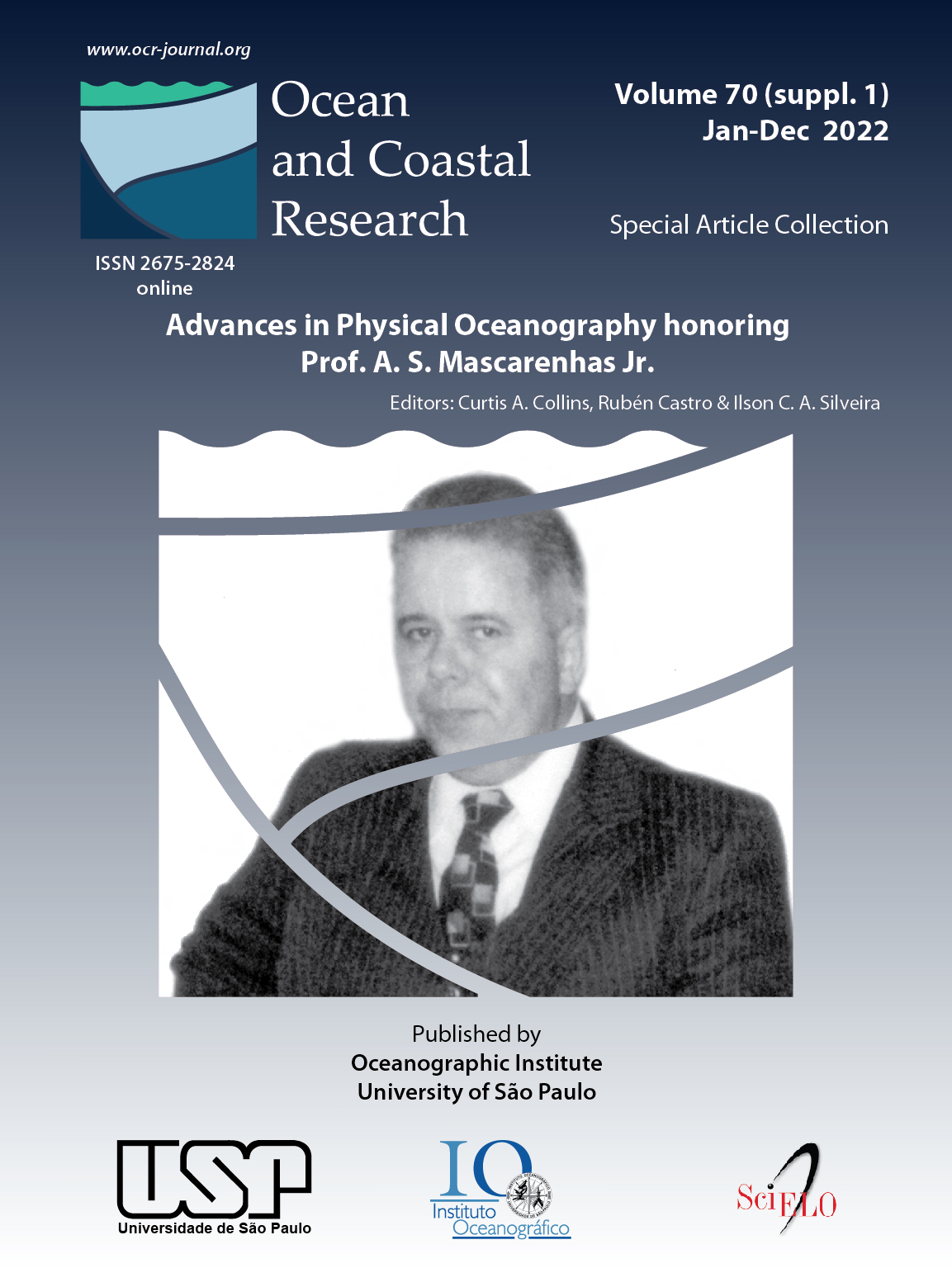
Ocean and Coastal Research: Advances in Physical Oceanography honoring Prof. A. S. Mascarenhas Jr. (Special Article Collection)
Vol. 70 No. Suppl. 1 (2022)This special article collection of Ocean and Coastal Research is dedicated to Prof. Affonso da Silveira Mascarenhas Jr. and includes eight scientific contributions from a few of his friends and colleagues.
For this volume the eight manuscripts have been organized chronologically by type. Original Articles include: (1) Dewar and Deremble (2022) argue that the ultimate role of surface buoyancy fluxes is to damp the ocean circulation and that ocean energy cycles between internal and kinetic. (2) Flierl (2022) examined nonlinear topographic waves in barotropic, rigid lid models with a focus on how depth shapes can or cannot support solitary waves. (3) Collins and Castro (2022) discuss mass and heat flux measurements at the entrance to the Gulf of California. (4) Bou-Haya and Sato (2022) investigated the heat storage variability of the Brazil Current using a numerical ocean model and expendable bathythermograph measurements. (5) In a Brief Communication, Navarro-Olache et al. (2022) describe the evolution of a submesoscale eddy in Todos Santos Bay, Baja California, México, which was observed by high-frequency radar. (6) A Case Report by Pardo et al. (2022) describes the implementation of a portable module to measure the inorganic nutrients of surface ocean waters and describe the module’s ability to determine the eutrophication risk in upwelled waters along the NW Iberian Peninsula. Methods articles include: (7) Chu and Fan (2022), who describe eddy characteristics in the California Current based upon empirical mode decomposition of SOFAR float trajectories; and (8) Amorim et al. (2022), who develop a new technique to extrapolate velocity profiles in the South Brazil Bight using vertical dynamic modes.
This is the Volume 70, Suppl. 1 (2022) of the Ocean and Coastal Research.
-

Ocean and Coastal Research (regular volume)
Vol. 70 (2022)Ocean and Coastal Research (OCR) is an international, peer-reviewed, and open-access journal with no article processing charges (APC) that publishes research in Oceanography, Fisheries, Marine Conservation, and related fields in Marine Science. Ocean and Coastal Research adopts a continuous publication model (CAP/rolling pass) of articles submitted in the English language.
This is the Volume 70 (2022) of the Ocean and Coastal Research.
-

Ocean and Coastal Research: The Ocean Decade in the perspective of the Global South (Special Article Collection)
Vol. 69 No. Suppl. 1 (2021)This Special Issue on the Ocean Decade in the Global South was envisioned by the UNESCO Chair on Ocean Sustainability (http://catedraoceano.iea.usp.br/) to take advantage of the Ocean Decade process to unveil the perspectives of vulnerable countries and regions regarding emerging and critical ocean-related issues.
The Chair is in direct alignment with the UNESCO mission and operates in synergy with the overarching objectives of UNESCO’s and IOC’s Medium-Term Strategy. The Sustainable Development Goals (SDGs) are also at the core of the Chair objectives. The Ocean Decade is one of the main inspirations of the Chair, which intends to promote integrated and interdisciplinary science for ocean sustainability through knowledge co-production and public dissemination, thus contributing to ocean literacy and social control. It also aims to actively reach out to policymakers, thus contributing to better-informed decision-making. The Chair acts by channeling institutions and ongoing activities and catalyzing partnerships and actions for ocean sustainability. The Chair is also building a multi-stakeholder Ocean Partnership that would contribute to the transition to a sustainable ocean, taking into consideration social, economic, and cultural development. In this way, the Chair contributes to the Ocean Decade through promotion in various manners and at several levels. This Special Issue is one such strategy to connect science, ocean, and society, with a dedicated focus on the countries that lag the ocean science leadership.
The Special Issue on the Ocean Decade on the Global South intended to summarize the key issues requiring focus (status and trends), key science and capacity development needs (gaps, challenges, and opportunities), and/or recommendations (pathways for solutions and cross-cutting priorities) for the science-policy agenda to achieve the Ocean Decade outcomes and face its challenges. It is assumed that recommendations of the published papers will be used by governments, agencies, companies, scientists, and society to set priorities for future action and research towards the sustainable use of the ocean.
The Special Issue is comprised of eleven papers, either collective positioning, reviews, or case reports, covering emerging topics of ocean science, from blue economy, ocean literacy, and gender balance to a safe ocean, and regions, such as Western Africa, the Mediterranean, the Western Tropical Atlantic, and the Caribbean.
This is the Volume 69, Suppl. 1 (2021) of the Ocean and Coastal Research.
-
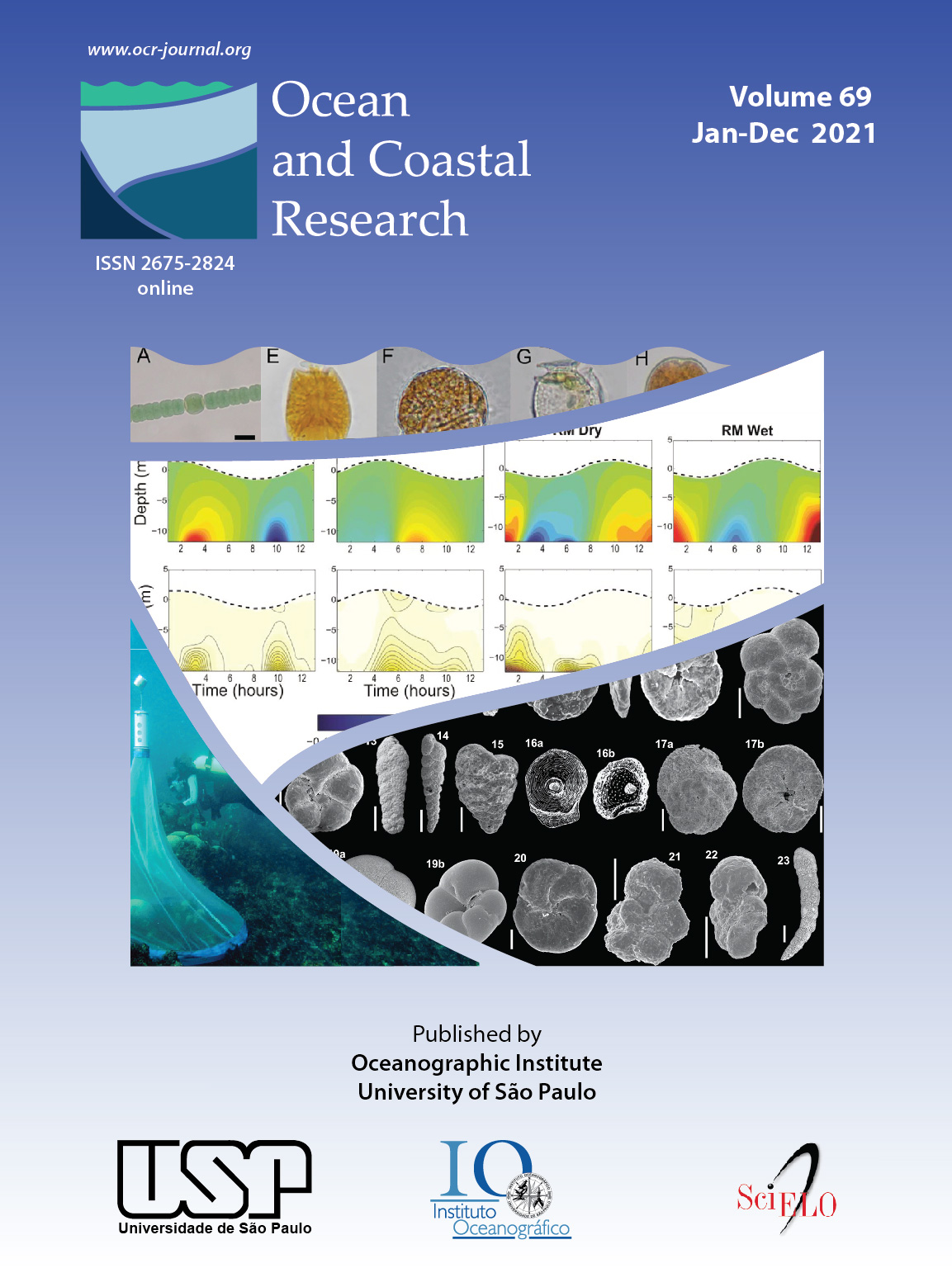
Ocean and Coastal Research (regular volume)
Vol. 69 (2021)Ocean and Coastal Research (OCR) is an international, peer-reviewed, and open-access journal with no article processing charges (APC) that publishes research in Oceanography, Fisheries, Marine Conservation, and related fields in Marine Science. Ocean and Coastal Research adopts a continuous publication model (CAP/rolling pass) of articles submitted in the English language.
This is the Volume 69 (2021) of the Ocean and Coastal Research.
-
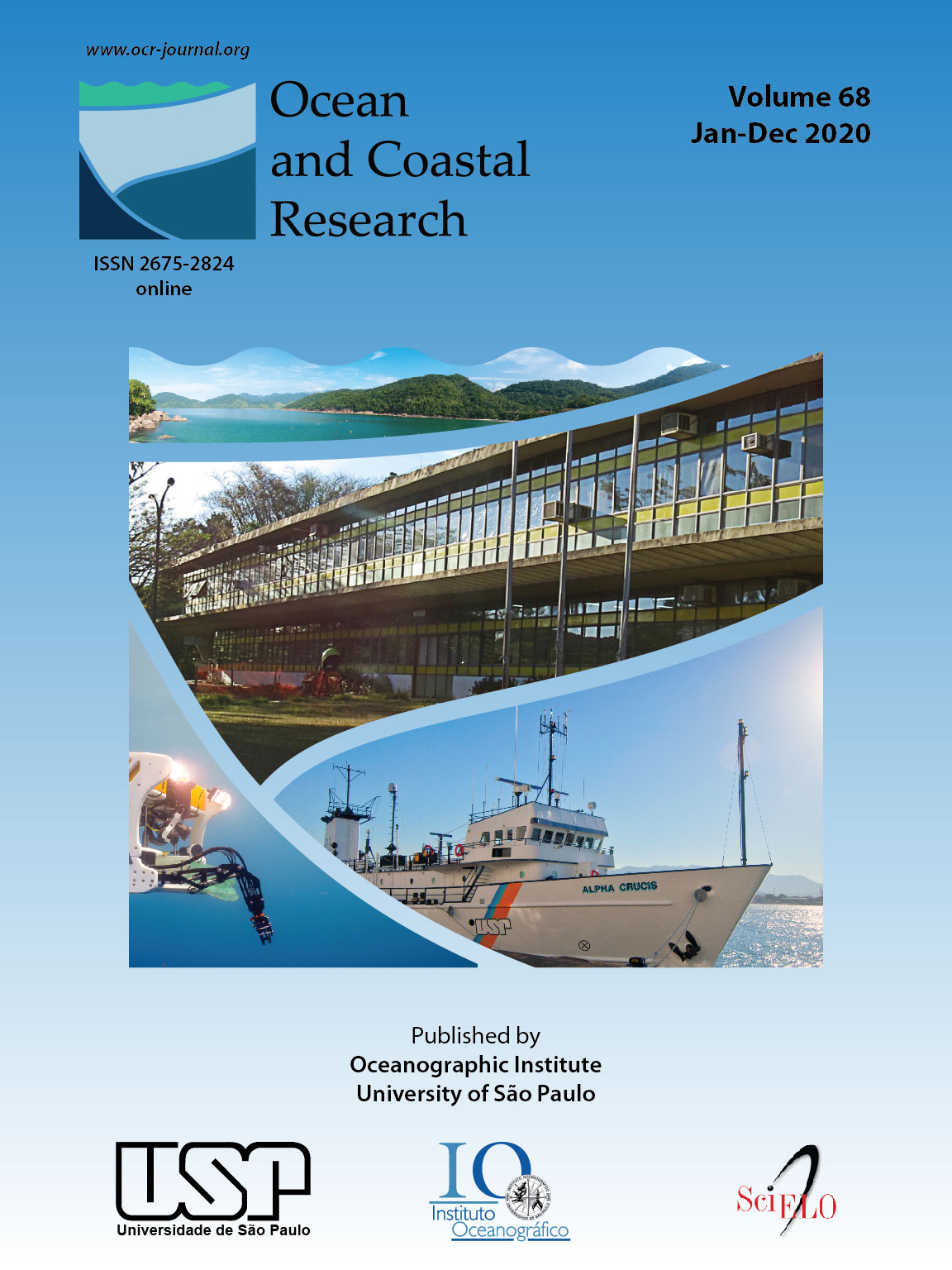
Ocean and Coastal Research (regular volume)
Vol. 68 (2020)Ocean and Coastal Research (OCR) is an international, peer-reviewed, and open-access journal with no article processing charges (APC) that publishes research in Oceanography, Fisheries, Marine Conservation, and related fields in Marine Science. Ocean and Coastal Research adopts a continuous publication model (CAP/rolling pass) of articles submitted in the English language.
This is the Volume 68 (2020) of the Ocean and Coastal Research.
The volumes are numbered from the first designations of Ocean and Coastal Research (OCR).
Ocean and Coastal Research is the new designation of the Brazilian Journal of Oceanography (BJO), a successful journal published uninterrupted since 1950.Other previous designations were:



